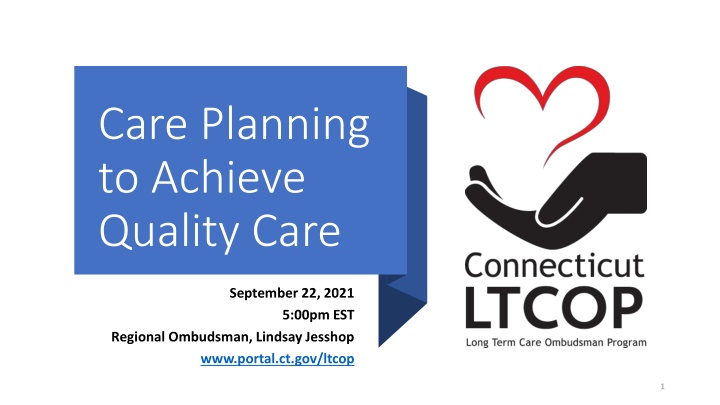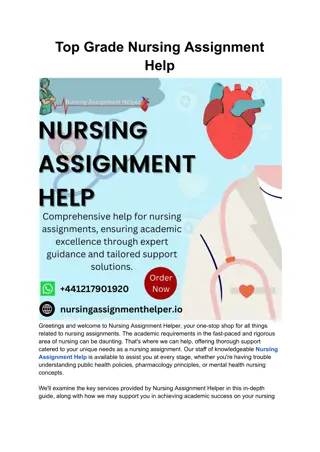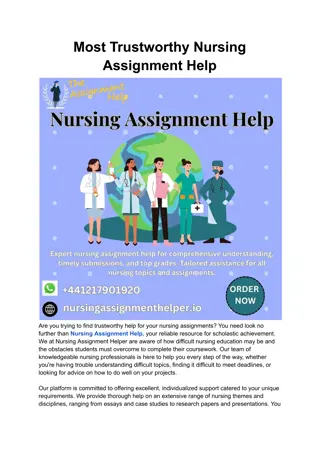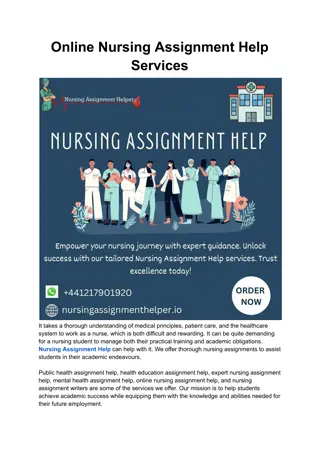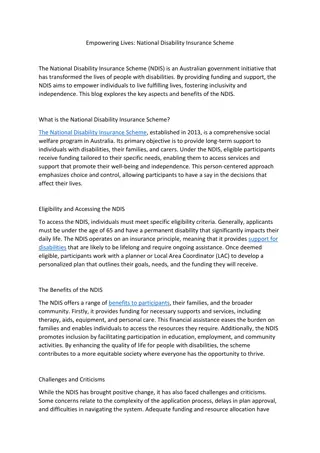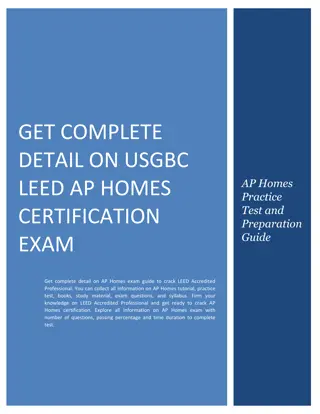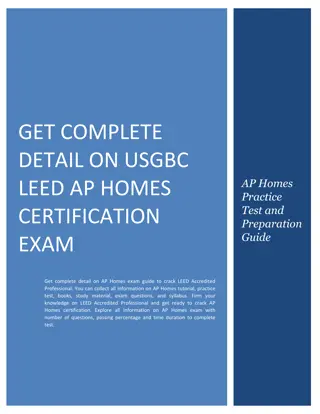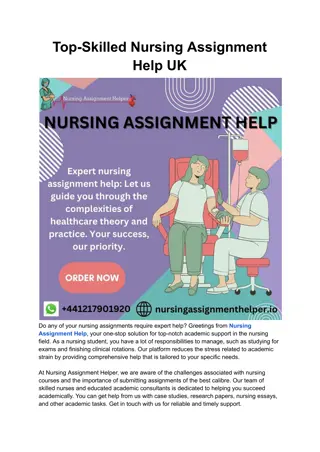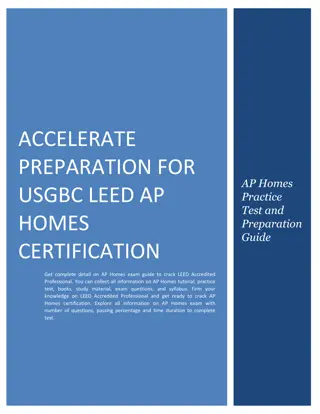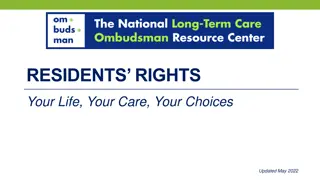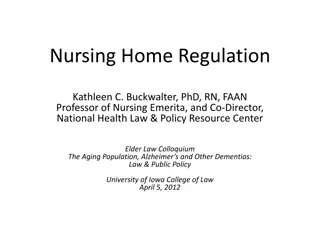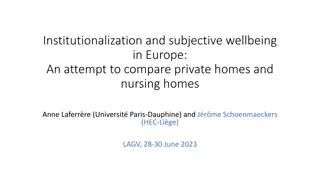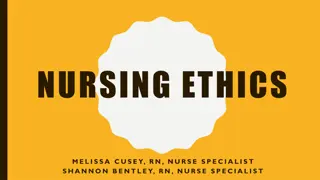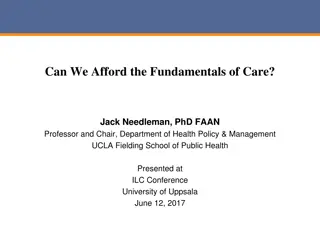Basics of Care Planning for Quality Care in Nursing Homes
Admission to a nursing home requires completion of a baseline care plan within 48 hours, including physician orders, therapy services, goals, dietary orders, and more. Best practices involve involving individuals in assessments, setting attainable goals, and explaining next steps. A comprehensive resident assessment, including communication, discharge planning, psychosocial elements, and routine preferences, must also be completed within 14 days.
Download Presentation

Please find below an Image/Link to download the presentation.
The content on the website is provided AS IS for your information and personal use only. It may not be sold, licensed, or shared on other websites without obtaining consent from the author.If you encounter any issues during the download, it is possible that the publisher has removed the file from their server.
You are allowed to download the files provided on this website for personal or commercial use, subject to the condition that they are used lawfully. All files are the property of their respective owners.
The content on the website is provided AS IS for your information and personal use only. It may not be sold, licensed, or shared on other websites without obtaining consent from the author.
E N D
Presentation Transcript
Care Planning to Achieve Quality Care September 22, 2021 5:00pm EST Regional Ombudsman, Lindsay Jesshop www.portal.ct.gov/ltcop 1
Upon admission, a baseline care plan must be completed within 48 hours 483.21(a)(1) of Federal Nursing Home Regulations; F655 (F-Tag) Provisions for person-centered care At the Start Required to include physician orders, therapy services, initial goals based on admission documents, dietary orders, social service supports, and PASRR information if needed The nursing home MUST provide the individual and their indicated representative a written summary which includes list of current prescribed medications, goals for the individual, and services and treatments that will be provided by the nursing home The medical record MUST indicate that the summary was provided to the person and their representative 2
Best Practices for Baseline Care Plans Best Practices for Baseline Care Plans Discuss Discharge Planning / Goals Upfront Does the person have a safe place to return to Possible Money Follows the Person [MFP] / Community First Choice [CFC] referral Complete With and Not For Include the person and their representative/s in assessments (ensure to include factors other than clinical, such as spiritual, socio-economic, sociocultural, etc.) Completion of a comprehensive care plan in lieu of baseline, especially if stay will be short; < 14 days Create Short and Attainable Goals Goals will be re-assessed and modified as time goes on Explain Next Steps Comprehensive assessment and care plan to follow Allow the person and their representative to ask questions 3
A comprehensive resident assessment must be completed within 14 days of admission 483.20 of the Federal Nursing Home regulations Assessment must be completed periodically and must be standardized and reproducible At the Start Utilization of Minimum Data Det (MDS) 3.0; Resident Assessment Instrument Accurate assessment of a person s abilities and functional capacity , but needs to include the following: communication, discharge planning; psychosocial elements, routine, preferences, and documentation of a person s participation in assessment The assessment must include direct observation and correspondence with the resident. Additionally, licensed and non-licensed direct care staff on all shifts should be consulted in order to complete assessment. Completed not less than once every 12 months or within 14 days of a significant change in a person s physical or mental condition 4
What is a Significant Change? What is a Significant Change? A significant change is classified as a major decline or improvement in a resident s status that 1) will not normally resolve itself without intervention by staff or by implementing standard disease-related clinical interventions; the decline is not considered self-limiting ; 2) impacts more than one area of the resident s health status; and 3) requires interdisciplinary review/and or revision of the care plan. This does not change the facility s requirement to immediately consult with a resident s physician of changes as required 483.20(b)(2)(ii) Federal Nursing Home Regulations ; F637 483.20(b)(2)(ii) Federal Nursing Home Regulations ; F637 Assessment After Significant Change Assessment After Significant Change Examples of Significant Changes Noted weight loss / weight gain Injuries (fractures, falls) Hospitalization requiring admission (sickness; infection) Change in ambulation / transfer status 5
Best Practices for Comprehensive Resident Best Practices for Comprehensive Resident Assessments Assessments Know the person Baseline condition / demeanor / ADL status Preferences / routine Establish a relationship with resident and with family members / preferred persons and family establish a rapport with nursing home staff Consistent staff assignment whenever possible Report changes Important for front-line and direct care staff to report any changes (not just significant) Request that staff report and document any changes Request that RN assess resident and document * Reported changes may prompt comprehensive assessment, followed by comprehensive care plan meeting 6
Comprehensive care plan is developed within 7 days of assessment 483.21(b) of Federal Nursing Home Regulations; F656 (F-Tag) A Care Plan is Working Live Document Person-centered and encompasses measurable goals, interventions, and timeframes to meet a person s desired outcomes Consider a person s medical, physical, nursing, mental, and psychosocial needs A person s goals for admission and discharge; nursing homes must document if a person s desire to return to the community was assessed and if any referrals were completed on a person s behalf A person or their representative can discuss the care plan and changes to the care plan with the nursing home at any time 7
Care Plan Meetings / Care Conferences Care Plan Meetings / Care Conferences How often? Initial care plan meeting to discuss developed care plan Then, every 3 months unless there is a significant change in a person s health that triggers a change in the care plan Meetings to discuss a person s plan of care or services can be requested at any time A resident always has the right to request a meeting to discuss his or her care and to address any questions or concerns they may have 8
Physician Services Physician Services How often? 483.30; F712 At least once every 30 days for the first 90 days after admission, and at least once every 60 days thereafter Considered on-time if it occurs no later than 10 days after the visit was required After the initial physician s visit a NP, APRN, PA may complete every other visit or other medically necessary visits (including orders) Residents have the right to request consultation with their physician at any time Residents have the right to change attending physician; nursing home should have more than one attending physician, plus Medical Director 9
Best Practices for Care Plan Meetings Best Practices for Care Plan Meetings Before the Meeting Re-arrange the time or reschedule so that resident and desired representatives can attend Ask for a copy of current care plan / list of medications Seek input from physician /physician services Provide staff with any questions or agenda items you would like to discuss at the meting If you would like specific staff at the meeting request this prior to meeting Meeting do not have to be 15 minutes if you would like longer pre-arrange with nursing home staff During the Meeting Carefully review your preferences - request that preferences are explicitly state in the plan of care Discuss plans for discharge , goals, and interventions Ask what other services can be offered (rehab and other contracted services If all your questions have not been answered during the timeframe, request a day and time to follow-up with key personnel After the Meeting Request a copy of the care plan Determine if care plan is being followed; determine if discussed interventions are occurring Request follow-up meeting if needed 10
Federal Nursing Home Regulations 483.24 Quality of Life Person Centered Care Planning is a Requirement Each resident must receive and the facility must provide the necessary care and services to attain or maintain the highest practicable physical, mental, and psychosocial well-being, consistent with the resident s comprehensive assessment and plan of care. (a) Based on the comprehensive assessment of a resident and consistent with the resident's needs and choices, the facility must provide the necessary care and services to ensure that a resident's abilities in activities of daily living do not diminish unless circumstances of the individual s clinical condition demonstrate that such diminution was unavoidable. 11
Federal Nursing Home Regulation 483.70 Facility Assessment; F-Tag 838 The facility must conduct and document a facility-wide assessment to determine what resources are necessary to care for its residents competently during both day-to-day operations and emergencies. The facility must review and update that assessment, as necessary, and at least annually. Person Centered Care Planning is a Requirement Must consider things such as number of residents; care needs of each resident, staff competencies to care for residents, services and equipment needed to care for resident population, and ethnic, cultural, or religious factors that may affect the care provided *CMS Guidance Although not required, facility staff are strongly encouraged to seek input from the resident/family council, residents, their representative(s), or families and incorporate that information as appropriate when formulating their assessment. An assessment of the resident population is the foundation of the facility assessment. It must include an evaluation of diseases, conditions, physical, functional or cognitive status, acuity of the resident population, and any other pertinent information about the residents that may affect and plan for the services the facility must provide 12
Additional Resources Additional Resources National Consumer Voice Basics of Individualized Quality Care - o https://theconsumervoice.org/uploads/files/issues/basics-of-individualized-quality-care-factsheet-final.pdf - Assessment and Care Planning: The Key To Quality Care o https://theconsumervoice.org/uploads/files/issues/assessment__care_planning-final.pdf - Individualized Assessment and Care Planning with Behavior Symptoms o https://theconsumervoice.org/uploads/files/issues/individualized-assessment-with-behavioral-symptoms-factsheet- 1.pdf - 6 Steps for Quality care handout o https://theconsumervoice.org/uploads/files/long-term-care- recipient/5._6_Steps_to_Getting_Quality_Care_in_a_Nursing_Home.pdf - Advocacy Suggestions for Nursing Home Residents and Their Families o https://theconsumervoice.org/uploads/files/family- member/Advocacy_Suggestions_for_Nursing_Home_Residents_and_their_Families.pdf 13
Additional Resources Additional Resources Center for Medicare Advocacy o Nursing Home / Skilled Nursing Facility Care - Center for Medicare Advocacy Massachusetts Advocates for Nursing Home Reform !Care Plans_final_9.26.19_2_onepage (manhr.org) o Justice in Aging o Updated for COVID-19: 25 Common Nursing Home Problems & How to Resolve Them JUSTICE IN AGING Long Term Care Community Coalition o Family & Ombudsman Resource Center - NursingHome411 14
